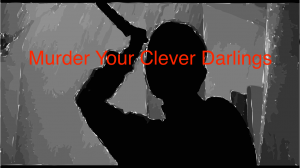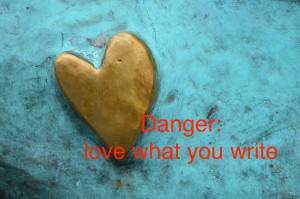“If I come across anything in my work that smacks of ‘good writing,’ I immediately strike it out.” —Elmore Leonard
Who Said It
Most writers have heard British journalist, critic, and novelist Sir Arthur Quiller-Couch’s saying, “Murder your darlings.”
Quiller-Couch (1863-1944) said: “Style, for example, is not—can never be—extraneous Ornament. … Whenever you feel an impulse to perpetrate a piece of exceptionally fine writing, obey it—wholeheartedly—and delete it before sending your manuscript to press. Murder your darlings.”
Who Didn’t Say It (except in different words)
Collectively, the authors of several articles mentioned the quote has been attributed to:
Allen Ginsberg,
William Faulkner,
Oscar Wilde,
Eudora Welty,
G.K. Chesterton,
Anton Chekov,
Stephen King,
Mark Twain,
Ernest Hemmingway,
George Orwell,
W. H. Auden,
Samuel Johnson,
Scott Fitzgerald, and
Vladimir Nabokov.
This makes a point:
“But it’s not surprising that other smart, successful writers would echo the professor’s suggestion. After all, they know the inevitability of getting a little blood on their hands.” —Daphne Gray-Grant
What It Means
“Eliminate all words or phrases, no matter how pleasing, that draw undue attention to themselves (or the writer) at the expense of the narrative flow.” —David Corbett (Writer’s Digest May/June 2013 “Clearing Out the Clutter”)
“Darling” writing—and by that I mean writing that is clever, self-conscious, inappropriately literary or writing that otherwise calls undue attention to itself—usually sounds forced and labored.”
—Daphne Gray-Grant
Why Writers Write Darlings
“When you start out, every word you write is precious. The words are torn from you. You wrestle with them, forcing them to express what you’re trying to say. … To you the writing shines with inner radiance and significance.”
—Rob Parnell
“It says, ‘look at me,’ instead of, ‘keep reading.’” —David Corbett (Writer’s Digest May/June 2013 “Clearing Out the Clutter”)
“When you’re in love with what you’ve written you’re like the 16-year-old who can’t spot the flaws in her own boyfriend. … ‘Darling’ phrases, if we’re honest, are usually about showing off a bit.” —Daphne Gray-Grant
How to Deal With It
“It is a metaphor for how you should behave toward your writing while you are revising it. The idea is to proceed objectively without sentiment. Just like you would if you were to kill a loved one.” —Seth Fried
“But after a while [after editors hack your darlings], you realize you’re being helped. That it’s not the words that matter so much as what you’re trying to communicate.” —Rob Parnell
“Try to train yourself to read your own work as a disinterested party … Read your work out loud.” —David Corbett (Writer’s Digest May/June 2013 “Clearing Out the Clutter”)
Example
My heroine opens the door to a new neighbor. He hurt her in high school, but he doesn’t recognize her now.
“Do you have a razor blade I could borrow?”
“Not if you’re contemplating slitting your wrists.”
An insensitive comeback to the character and possibly the reader.
Possible rewrite:
“Sugar, yes. Razor blade, not so sure.”
Sometimes you need to take an axe to your “clever” writing. Click to tweet.
What is a darling you had to murder?






 RSS - Posts
RSS - Posts



Too many to list! But I have to say, I liked the first comeback. It thought it showed her bitterness and set up the tension in their relationship.
Of course, that’s why we need others to critique and edit or work. We have a hard time recognizing what takes the reader out of the story because we are in the middle of it, and everything makes sense to us.
Obviously, I liked it at first, too, Jane. But after I thought about it, she knows he thinks she’s his new neighbor—someone he doesn’t know. I thought it would make her unlikeable to say that to a “stranger.” Also, many (including myself) who know people who have committed suicide would think it is not something to joke about. So I decide she could put her digs in later in another way.
Hum . . . points well taken. I can see both sides. Does genre make any difference? In other words, would this possibly fit in a women’s fiction, but not in a romance? I see those two attracting different readers.
If you’re talking about the comeback in the example, Gail, it might depend more on the character who says it. I thought I should be careful with a heroine.
In this instance I’d think she would respond with a question– it is an unusual request. Maybe something like: “I’m not sure I have one. What do you need a razor blade for?”
As to darlings– oh yeah. It’s a never ending edit.
A question might work, Dan. Maybe instead of sounding nosy, though, she could ask, “A razor blade?” as if to say, “Did I hear you right? That’s a strange request.” Or maybe she’d come out and say the latter. Great discussion. Keep it coming.
I love your revised response. It’s witty, and helps to lighten what could be a too gloomy start.
Jane, my critique partner helps me murder my darlings. He he.